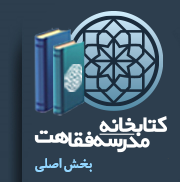
- مدرسه فقاهت
- کتابخانه مدرسه فقاهت
- کتابخانه تصویری (اصلی)
- کتابخانه اهل تسنن
- کتابخانه تصویری (اهل تسنن)
- ویکی فقه
- ویکی پرسش

- مدرسه فقاهت
- کتابخانه مدرسه فقاهت
- کتابخانه تصویری (اصلی)
- کتابخانه اهل تسنن
- کتابخانه تصویری (اهل تسنن)
- ویکی فقه
- ویکی پرسش
|
||||
| نام کتاب : نشریه معرفت نویسنده : موسسه آموزشی پژوهشی امام خمینی (ره) جلد : 57 صفحه : 13 | ||||
|
خلاصة المحتويات
الدكتور عباس علي شاملي يُعد الامام علي(عليه السلام) أول من وضع حجر الاساس لاروع و أدق و اكمل نظام تربوي على الاطلاق، ألا و هو النظام التربوي العلويّ. و قد أشار سماحة السيد القائد الخامنائي الى هذا المعنى في معرض حديثه عن شخصية أميرالمؤمنين(عليه السلام) بقوله ان الامام علي(عليه السلام) هو المثل الاعلى للانسانية قاطبة. و لذلك يمكننا القول بان الامام علي(عليه السلام)ليس قدوة الشباب المسلم فحسب انما هو قدوة كل من يريد السير على نهجه. تتناول المقالة بحث ما تضمنه الكتاب الحادي و الثلاثون من كتب اميرالمؤمنين(عليه السلام) الى عماله في الامصار المختلفة في نهج البلاغة. يتضمن الكتاب نقاطاً بالغة الاهمية يسترشد بها المربي في تجربته التربوية و في تعامله مع المتربي، و لذا فان العنوان المناسب للارشادات الواردة في هذا الكتاب هو الشروط اللازمة لبناء علاقة مع المتربي.
جودث جي سمتانا تعرض المقالة تحليلاً ـ من وجهة نظر علم الاجتماع ـ للدور الذي يلعبه الوالدان في تنمية القيم الاخلاقية لدى الاطفال. ترى المقالة بأنه على الرغم من ان التفاعل الاجتماعي بين الافراد يمثل عاملاً مهماً في بناء النظام الاخلاقي إلا ان ما يملكه الوالدان من عواطف و وعي في تعاملهما مع اطفالهما يعدّ من العوامل المهمة التي تسهّل عملية التربية الاخلاقية للاطفال، كما ان للجوّ العاطفي الذي يوفره الوالدان اثراً على مدى استجابة و امتثال الابناء لارشادات الوالدين اضافة الى ذلك يمكن ان يؤثر نوع العاطفة التي يبديها الوالدان في مقابل تجاوزات الابناء على مدى استيعاب الاطفال لارشادات الوالدين و تذكرهم للحوادث. و على الرغم من ان التجارب الاخلاقية للوالدين مع ابنائهما غالباً ما تحدث لاطفال ذوي اعمار متقاربة الا انه ينبغي على الوالدين اتخاذ مواقف خاصة يراعى فيها طبيعة سلوك الاطفال الامر الذي يساعد على توفير آلية نجاح عملية التربية الاخلاقية. ان دور الوالدين يمكن ان يعّزز قدرة الابناء على استيعاب دور التربية الاخلاقية و ذلك عن طريق توفير الارضيّة المناسبة و تنمية قدرة الاستدلال الدقيق و توضيح الجوانب الاجتماعية المختلفة في حياة الطفل و التي يمكن ان تلعب دوراً مهماً في بلورة نظرة اخلاقية افضل. تتضمن المقالة استنتاجات الكاتب المبنيّة على ملاحظاته للبيئة الاجتماعية مع تحليل لها في اطار رؤية علم الاجتماع للموضوع.
محمد رضا مطهري تسعى هذه المقاله لبيان و شرح اسس التوجيه و المشورة و نظرة الاسلام حول هذا الموضوع و ذلك بالاستناد الى الايات القرآنية و روايات و سيرة المعصومين و كذلك آراء المفكرين. تحظى العناصر الاساسية لأّى علم باهمية خاصة، فهي بمثابة حجرالاساس لذلك العلم. ان اساس نشاطات و طرق التوجيه و المشورة يقوم على هذه العناصر الاساسية و ان هذه الاخيره تحدد اتجاه نشاطات و طرق و فنون المشورة. ان عملية التوجيه في الاسلام تعمد على الاسس التالية: الكرامة، الاختيار، المسؤولية الانسانية، البحث عن الكمال، الفوارق الفردية، اعتماد التعاون و العون كاساس للتوجيه بدلاً من التحكّم و القسر. يتناول الكاتب بحث هذا الموضوع بشكل مفصل.
Dr. Abbas Ali Shamili The Alawi educational ideas i.e. introduced by Imam Ali, are unequalled and most perfect, and as the grand leader once said "Imam Ali (upon him be peace) is a perfect example for all". This implies that he is a good example for the young Muslims and also for those who seek to emulate Imam¨s course. The close study made by the writer of Imam¨s letter number thirty - one in Nahjul Balaghah marks a number of eductional principles, which are valuable broad lines for the educaters who seek to buid educational ties with those being educated. These principles come under the heading: educational prerequisites for building ties with the educated.
Judith G. Smetana trans: Gholam Rida Motaqi - fer This article provides a social domain theory analysis of the role of parents in moral development. Social knowledge domains, including morality as distinct from other social concepts, are described. Then, it is proposed that, although morality is constructed from reciprocal social interactions, both affective and cognitive components of parents interatcions with their children may facilitate children¨s moral development. The affective conext of the relationship may influence children¨s motivation to listen to and respond to parents; in addition, affect associated with responses to transgressions can affect children¨s encoding and remembering of those events. Although moral interactions occur frequently in peer contexts, parents¨ domain - specific feedback about the nature of children¨s moral interactions are proposed to provide a cognitive mechanism for faciliating moral development. Parents promote children¨s moral understanding by providing domain appropriate and developmentally sensitive reasoning and explanations about the child¨s social world, which may stimulate the development of more mature moral thought. Various findings from the socialisation literature are presented and interpreted from within the social domain framework.
Muhammad Rida Muttahari This article, which makes use of such references as the Holy Qur¨an, the traditions and lifestyle of the Infalliables and Muslim thinkers¨ views, seeks to bring out the fundamental principles of guidance and counselling as viewed by Islam. The principles of a science are of great influence; they constintute the foundation of that science. The soundness of the activities and methods of guidance and counselling depends on the principles of the science. In fact, these principles determine the course of the methods and techniques of counselling and play an effective role in guidance and counselling. According to Islam, the basic elements of guidance are: dignity, free will, man¨s being responsible, taking care of all aspects of man¨s existence, seeking human perfection, individuals¨ different potentials, coordination and cooperation as the bases of guidance, not commanding and force.
|
||||
| نام کتاب : نشریه معرفت نویسنده : موسسه آموزشی پژوهشی امام خمینی (ره) جلد : 57 صفحه : 13 | ||||
|
www.eShia.ir